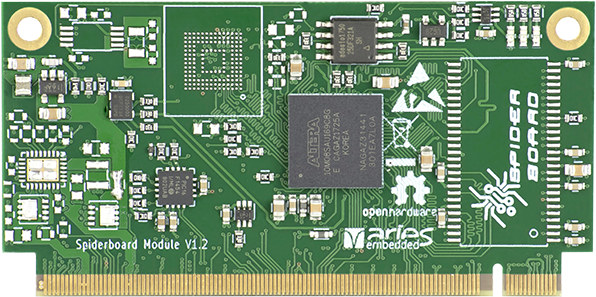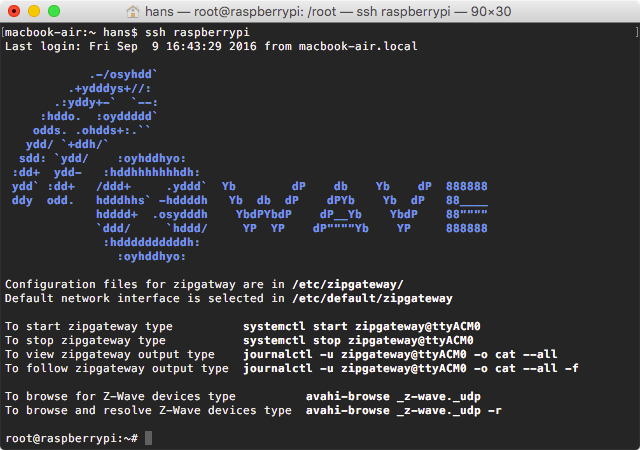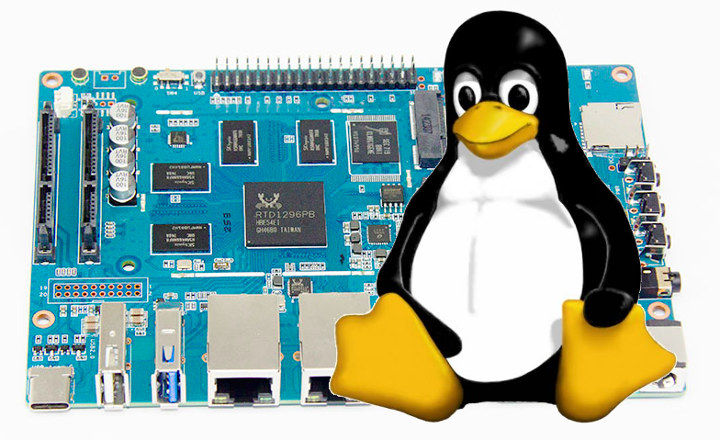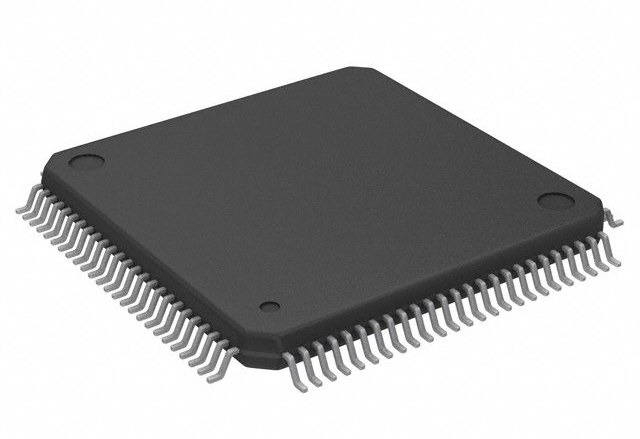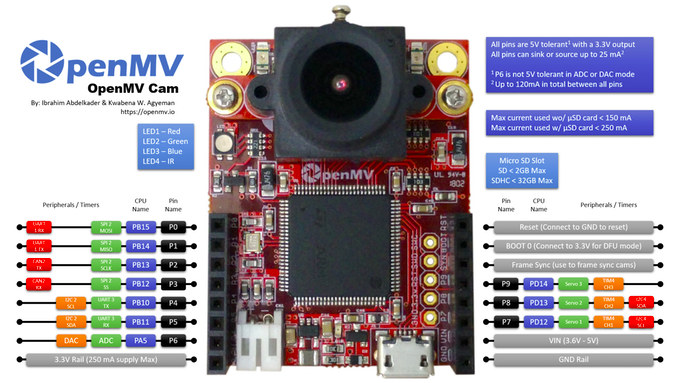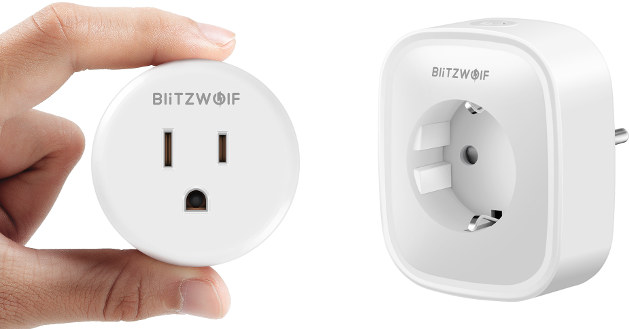A few years ago, various companies tried to develop other Linux based mobile operating systems, but most failed with Mozilla Firefox OS discontinued, Samsung Tizen is not being used in smartphones anymore, and Sailfish OS giving up the consumer market focusing on governmental and corporate customers instead. There’s still a niche market however for privacy-focused, open source Linux smartphones, and we’ve already covered NXP i.MX 8M based Purism Librem 5 smartphone scheduled to launch next year with GNOME based PureOS operating system, and the ability to switch to PureOS with KDE Plasma Mobile or Ubuntu Touch. Necuno Mobile will be another Linux smartphone based on an NXP processor, but instead of relying on a 64-bit i.MX 8M processor, it will be equipped with the older 32-bit i.MX 6Quad processor, and according to the company be “100% open source device, from metal to pixel, from hardware to software”. Necuno Mobile preliminary […]
Open Source Hardware SpiderSoM System-on-Module Features Intel MAX 10 FPGA
When embedded systems companies offer a system-on-module (SoM) and a baseboard, the later is usually open source hardware with all design files provided so that customers can leverage the work for their own baseboard, but files for the SoM are normally not released to customers. Intel MAX 10 FPGA based Aries SpiderSoM and SpiderBase change that, as the company has decided to release both the module and carrier board KiCAD designs under a CERN OHL v1.2 license. SpiderSoM system-on-module specifications: FPGA – Intel MAX 10 FPGA in F256 package from 10M04DC to 10M50DA System Memory – Optional 128/256/512MB DDR3 DRAM for 10M 16/25/40/50 FPGAs Storage – Optional 4 MB SPI NOR, optional 4 GB eMMC flash 230-pin MxM2 edge connector with 178x FPGA GPIO pins, including 13 LVDS transmitters and 54 receivers Misc – RTC with battery backup, programmable clock generator and PLL, with optional external reference input Power Supply […]
Silicon Labs Releases Z-Wave Public SDK, Raspberry Pi 3 Image
Z-Wave is a wireless communication protocol initially developed by Zensys, before being purchased by Sigma Designs which provided Z-Wave compliant chips, and this year Silicon Labs purchased Z-Wave from Sigma Designs, Z-Wave is fairly popular in the US, and the Z-Wave alliance has certified around 2,400 products so far. However, we seldom hear about hobbyist projects featuring Z-Wave because the wireless protocol is proprietary, documentation was not available publicly, and you’d also need a few thousands dollars to get started: $4,000 a year to be a Z-Wave Alliance member, $2,500 for certification, and the development kit sells for about $2,000… But in 2016, things improved with Sigma Designs releasing Z-Wave Application Layer specifications publicly, as well as Z-Wave over IP (Z/IP), Z-Ware Middleware, and the Z-Wave S2 Security Specification. But you still needed to acquire the Z-Wave SDK and obtain access to the Z-Wave Technical Support website and the Z-Wave […]
Dav1d Open Source AV1 Decoder Aims to be Fast and Lightweight
Lots of efforts are being put into AV1 open source, royalty-free video codec with the AV1 specification published in March, and companies like YouTube and Netflix having recently uploaded AV1 video samples for testing and evaluation. We also reported FFmpeg 4.0 was released with AV1 supporting using libaom reference decoder. However, the library is not really optimized for code size and speed, but instead just to demonstrate AV1 decoding and encoding. So VideoLAN, VLC and FFmpeg communities have been working on another decoder called Dav1d – which stands for “Dav1d is an AV1 Decoder” – that aims to be lightweight, cross-platform, fast and open source. Some of the technical details about dAV1d include: written in C99 without VLAs (Variable Length Arrays) ASM in NASM/GAS syntax (no intrinsics), Meson/ninja buildsystem, Works on x86, x64, ARMv7, ARMv8 architectures for now Runs on Windows, Linux, macOS, Android, iOS operating systems Licensed under BSD […]
Realtek RTD1296 U-boot & Linux Source Code Released, RTD1619 Cortex A55 SoC Shows up in Code
Media centers based on Realtek RTD1295 or RTD1296 processors have been around for a few years. They usually run both Android and OpenWrt operating systems for respectively media functions (4K video playback, HDMI input recording…), and NAS functions like file sharing. media downloads, etc…. SinoVoIP also unveiled Banana Pi BPI-W2 board powered by RTD1296 last year, but so far I was not aware of any source code for the target. Synlogy actually released a Linux 4.4 tarball a while ago, but more recently SinoVoIP released Linux 4.9.119 and U-boot source code for RTD1296 in Github. You’ll find instructions to build from source, and flash the resulting U-boot and Kernel image from the Github page. There’s also some mainline Linux support for RTD1295, but maybe this release will help further speed up mainline support. Beside code for RTD129x (RTD1295/RTD1296), we’ll find references to RTD139x (RTD1395) a cost-down version of RTD1295, as […]
Retro-uC Open Source MCU Brings ZX Spectrum, Commodore 64 Back to Life (Crowdfunding)
If you’ve started your computing experience in the early eighties, you’ve probably used a ZX Spectrum, Commodore 64, and/or Atari ST home computers. Those products are long gone, except for collectors, but thanks to chips4makers project’s Zilog Z80, MOS 6502, and Motorola M68K cores are coming back to life via Retro-uC open source microcontroller. As a bonus, developers also worked on Retrino, a board following Arduino Mega form factor, and featuring Retro-uC MCU, as well as Retro-uC ProtoPlus with the chip fitted to a large Perf+ 2 style prototyping board, and Retro-uC Breadboard which can be inserted into a standard breadboard. Retro-uC Microcontroller Retro-uC specifications: Open source microcontroller with a Z80, MOS 6502 and Motorola 68000 core 4 kB of on-chip RAM 72x 5V digital general purpose I/O pins JTAG interface for programming the device Optionally bootable from external I2C flash memory I/O pins that can select the enabled core […]
OpenMV Cam H7 MicroPython Machine Vision Camera Launched on Kickstarter
OpenMV team has launched an upgrade to their popular OpenMV CAM M7 machine vision camera, with OpenMV CAM H7 replacing the STMicro STM32F7 micro-controller by a more powerful STM32H7 MCU clocked at up to 400 MHz. Beside having twice the processing power, the new camera board also features removable camera modules for thermal vision and global shutter support. OpenMV CAM H7 camera board specifications: MCU – STMicro STM32H743VI Arm Cortex M7 microcontroller @ up to 400 MHz with 1MB RAM, 2MB flash. External Storage – micro SD card socket supporting up to 100 Mbps read/write to record videos and store machine vision assets. Camera modules Omnivision OV7725 image sensor (default) capable of taking 640×480 8-bit Grayscale / 16-bit RGB565 images at 60 FPS when the resolution is above 320×240 and 120 FPS when it is below; 2.8mm lens on a standard M12 lens mount Optional Global Shutter camera module to capture […]
BlitzWolf Inexpensive & Compact EU & US Smart Sockets Work with ESPurna & Sonoff-Tasmota Open Source Firmware
When I first started to look into WiFi smart sockets a few years, there were some fairly compact models such as the Linux based Kankun KK-SP3 or ESP8266 based Konke Mini K sockets. In recent years, more wireless smart sockets have come to market, but fewer companies have made compact models, and for example Sonoff S26 or Sonoff S31 smart sockets are not exactly small. But this morning I got contacted by a company called BlitzWolf that sells various accessories including low cost and compact smart sockets for the US and EU markets. It could prove to be interesting, so let’s check out the specifications: BlitzWolf BW-SHP1 US Smart Socket Rated Voltage – 110-240V @ 50-60 Hz Rated Current – 10A (Max) Max Total Power Output – 2000W Dimensions – 4.5 cm ∅ (VO fireproof material) Temperature Range – -10 to +60°C BlitzWolf BW-SHP2 EU Smart Socket Rated Voltage – […]



